By Adaobi Ezeokoli & Chibuike Alagboso (Lead Writers)
Professor Chris Bode, Chief Medical Director at the Lagos University Teaching Hospital (LUTH), is sitting at a conference table in his spacious office. A colourful artwork frame takes up the wall behind him, and files and papers are arranged on the table, remains of a meeting he has just cut short to speak with the Nigeria Health Watch team. It is a rainy Thursday morning in the middle of June 2020, and the COVID-19 outbreak has been in Nigeria for just over four months. Bode said he and his team at LUTH watched the unfolding of the global pandemic with acute interest, keenly aware that if and when cases were announced in Nigeria, the hospital, established in 1962 in Idi-Araba, Surulere, would be called upon to support the country’s response.
“We knew right from January with the news of the looming pandemic then, that there was no way we could be spared. We put our heads together and asked ‘What did we have? What did we need? What could we get?’” Bode recalls.
What the hospital had was “almost 200 consultant specialists in diverse fields, and we had just finished rehabilitating one of our blocks, Block B, with 120-bed capacity. We were ready to put that on the line for the COVID response,” Bode noted, adding that the Nigeria Centre for Disease Control (NCDC) and the Federal Government aided the hospital with 120 beds and consumables such as Personal Protective Equipment (PPEs).
In the meantime the hospital focused on training in preparation for COVID-19. “We had also started training earlier by February. Before March we started training ourselves to be able to handle an infectious disease like the COVID-19 even when we had not seen one case. We had experience with the management of other infectious diseases like Lassa Fever, so it was easy to put together a team. We started an all volunteer team of about 60 people. We now have more than a hundred staff that are diligently managing COVID-19,” Bode said.
The preparatory training was important for what LUTH would be tasked with in the coming days and months. Prof. Wasir Lanre Adeyemo, Chairman Medical Advisory Committee (CMAC), directs clinical services, training and research at LUTH. He says the teaching hospital’s experience in managing Lassa helped it prepare for COVID-19.
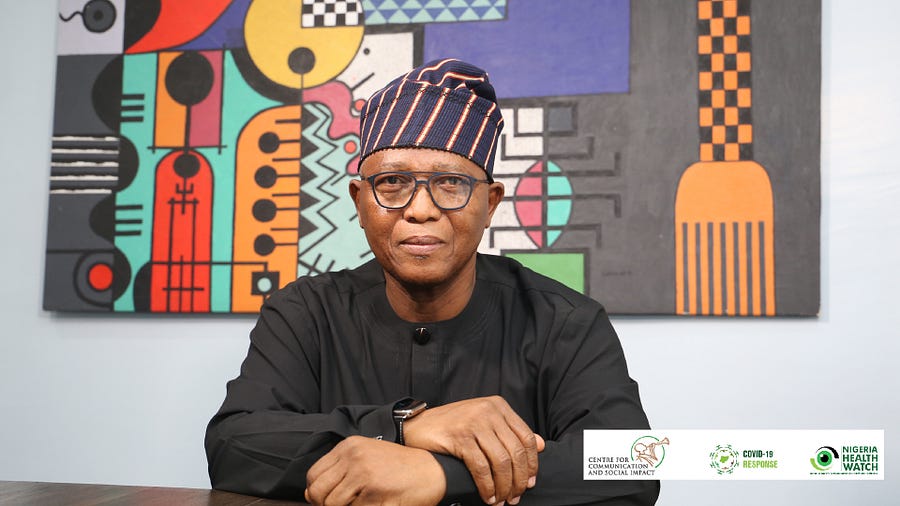
“In January and February, Lassa fever was an issue in the country and we are usually involved both in terms of clinical care and laboratory services. In fact, the first Lassa fever case that was diagnosed in Lagos was actually diagnosed and treated here at LUTH. So, we started preparation in terms of infection prevention and control (IPC), and infectious diseases training. A few weeks later, COVID-19 became established in Nigeria, and the first case was identified on February 27,” he said, adding that the CMD’s decision to prepare and to reserve Block B as a COVID-19 response ward was the best decision in the years he has been involved with the hospital.
In the early days the hospital announced that it needed volunteers from the staff to be trained as COVID-19 responders. About 120 people indicated interest and training began. When the Presidential Task Force and the Infectious Diseases Hospital Chairman came to LUTH to inspect the facilities, Adeyemo said they were ready. With the donations from NCDC and the Federal Government, the availability of the 120-bed ward, and the trained COVID-19 volunteer team all in place, on April 7, 2020, the hospital admitted its first four patients into the COVID-19 isolation ward.
Adeyemo noted that the training eventually had to be escalated to virtually the entire hospital. “We decided that those who volunteered for the case management will need to train across all the departments. As at today, we have trained virtually all the departments and units, over 600 people in LUTH, from drivers to cleaners to nurses to doctors to medical lab to admin people to security… We have trained everybody on infection prevention and control,” he said.
Preparation also included the laboratory at LUTH, which is one of the National Reference Laboratories for the country. Professor Sunday Aremu Omilabu heads the LUTH lab. He says the lab had already been responding to the Lassa fever outbreak and other viral hemorrhagic fevers, and he knew they would need to diagnose COVID-19 when it came to Nigeria. “So we started preparing our lab ahead of time in consultation with the NCDC. We designed primers and then waited for the virus to come in, then as soon as we made the diagnosis we used our own lab designed primers to do the sequencing. The sequence did not take us more than 48 hours before we ruled it out. We prepared ahead of time.” Prof. Omilabu was one of several people honoured by Lagos State for his contribution to the COVID-19 response.
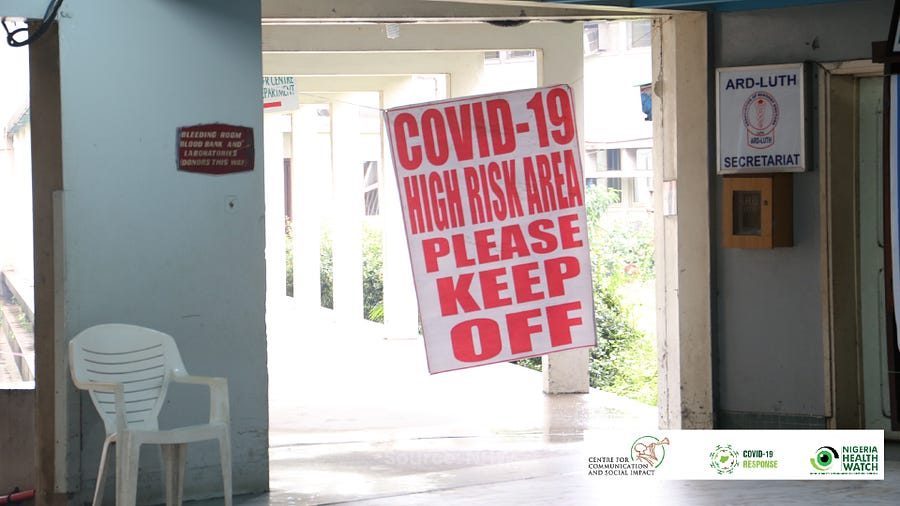
“The fear was real” — Taking the decision to deliver COVID-19 positive mothers
While preparing to support the COVID-19 response, the LUTH team encountered a unique challenge in managing a particular subset of patients. The hospital is passionate about preventing the death of women during pregnancy, so they had to decide if they were going to manage patients who were pregnant and positive for COVID-19.
Prof. Bode said it was not an easy decision to make, but he was of the opinion that LUTH should make provision to care for these patients, and part of this care included performing caesarean sections if the need arose. “I had to go against the popular opinion and say ‘Look we must do this, except you want me to go and scrub up with you. And we had to push ourselves because the fear was real, these are people with families, these are people who also feared for their lives,” Bode, who is also a Professor of Surgery, said.
Dr. Christian Chigozie Makwe is a Consultant Obstetrician and Gynecologist at LUTH, and a senior lecturer in the Department of Obstetrics and Gynecology at the University of Lagos. He said once the decision was made to manage COVID-19 positive pregnant women, they put protocols in place. “The Department of Obstetrics and Gynecology and the Department of Pediatrics, specifically neonatology unit, that’s the people who manage babies less than 28 days, sat down and decided to draw up a protocol, a guideline to know how to work in case we have a patient who presents to us in pregnancy and she is COVID-19 positive,” he said.
The management at LUTH also designated a dedicated theatre close to the isolation ward for COVID-19 positive patients who will need surgery. They also designated equipment specifically for this theatre as part of IPC measures, to prevent cross-contamination of equipment, Makwe said. “In the same suite where we do the caesarian section, we created a space with the delivery suite bed that could take vaginal delivery. We might have patients who might come in almost the second stage of delivery or in active labour. So, we had to also be ready for such situations.” he said.

“I didn’t know we could pull it off” — Facing the challenges of a COVID-19 delivery
Having the theatre in place was great, but it was a completely different reality when the first case presented itself to the team. “I will tell you, it was not easy when we finally had the first patient, it was like we were still not prepared the way we should have been, so we had to cross our T’s and dot our I’s,” Makwe said.
The team had to map out every possibility that could take place in the theatre and plan for it. “Everything we need for surgery must be available in the theatre before we start. If anything goes wrong, we cannot come out,” Makwe said, “so we planned every possible scenario and made sure we had every T crossed.” They used a regional technique to prevent exposing the virus into the air during anesthesia. They deployed a drug to help the patient’s uterus contract so that she would not leak blood and gave her drugs to prevent bleeding in the theatre in order to avoid the need for a blood transfusion.
One particular aspect of the preparation concerned him. “What was most interesting is that it was difficult to even assemble the first team to do the surgery. Until we completed that surgery, I didn’t know we could pull it off because we had people who volunteered to work with COVID positive patients and at the last minute they will tell you they won’t be in the theatre for a 1 hour or 2 hour surgery. So, there was that fear, it was a new virus. People didn’t know so much about it,” he said.
To successfully carry out the procedure, Makwe said they needed a team of, at least, six people in the theatre. “It took us a day to be sure we had the minimum we needed to conduct this surgery and until the morning of the surgery, I knew if one person pulled out, we won’t pull through because one of the things that we designed as part of IPC was to use the minimum number of staff required to execute the task. So, we had two obstetricians, dedicated, we had two anesthetists, we also had one nurse and one neonatologist, so we had six, that was the minimum we required. If one person pulled out, it was going to be difficult to execute that task,” he said.

A challenging task for a small but determined team. Makwe said the team of six simulated the surgery so that everyone would understand their roles, and team members had to take on additional tasks. “The anesthetist had to do some of what the technician should have done. The nurse was alone, she didn’t have a circulating nurse, so she had to do whatever she had to do to fill that vacuum. We only had two obstetricians and we were both operating. The neonatologist also had to do everything he had to as an individual, he had no support. So that was a lot of planning,” Makwe said.
He said the first case took the team about 36 hours to plan from the day the patient arrived until the actual surgery. “That was the first success story and that gave us a lot of confidence that we could do it. And after that, it was just like a routine for us,” Makwe said, adding that the time between deciding to deliver a COVID-19 pregnancy and actually doing the surgery has become shorter. “We had to improve on our strategy, the logistics, we are better now. So, we can do it even with short notice. There has been a lot of planning and the support we have had from the administration, from other departments has been fantastic. And I think you can’t do a project like this without a top leadership structure that supports you totally because there were things that were not there, they had to seek for them and made sure we had them before we started,” he said.
Prof. Bode said successfully delivering the first baby was the shot of confidence his team needed. “We did the first case and it was like we won’t do any more. We did the second one, and by the third and fourth case we became confident to say bring it on,” he said. The LUTH team has delivered seven COVID-19 positive women of eight babies and all of them are doing well, Makwe said.
The team deployed technology to communicate with patients before and after the procedures, using video calls to conduct calls with mothers in isolation. They also sent them the consent forms electronically so they could read through them before signing a physical copy on the day of the surgery. This, Dr. Makwe said, helped them allay fears of their patients and made them feel connected despite the limited physical contact as a result of COVID-19.
Another important decision the team made was to allow mothers to breastfeed their babies, despite their COVID-19 positive status. Makwe said babies were placed in a cot a short distance from their mothers after the surgery and mothers were taught safety measures to practice before breastfeeding, such as handwashing before and after feeding, washing their breast and nipples before feeding, and wearing a mask while breastfeeding.
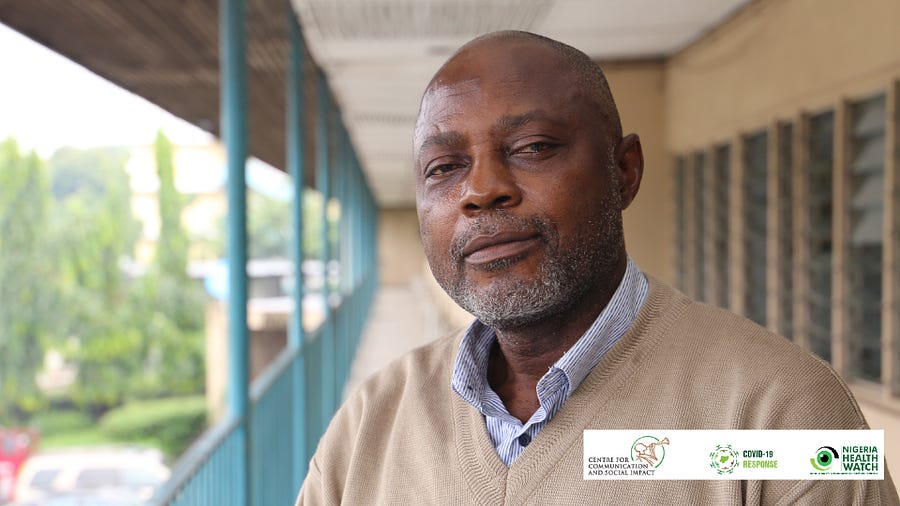
Lessons learned in pioneering COVID-19 pregnancy surgeries in Nigeria
For those that want to replicate what the LUTH team has done, Makwe said preparedness, logistics, capacity building and the ability to work as a team is key. Safety should also be a priority, he said. “The main thing is preventing infection transmission from patients to healthcare providers or to other patients. You must work on that, and that for me is like the most important aspect,” he said, adding, “And there we watch over each other. The guys that help us put on the suits and help us remove it, the donning and doffing, I see them like our lifeline. Those are the times during the process, where my whole attention comes. I’m so attentive to what he is saying and what he is telling me to do, because I know any mistake here can get me infected and that is the same for all the members of the team.”
The protocol the team produced has been published in The Journal of Maternal-Fetal & Neonatal Medicine and the International Journal of Gynaecology & Obstetrics, and a paper published in the Pan African Medical Journal.
For Prof. Adeyemo, his biggest lesson is the importance of training. He pointed out that what has really helped LUTH’s COVID-19 response is the fact that the 100 plus volunteers who were the hospital’s initial frontliners knew what to do to protect themselves. “When the suspicion of COVID-19 is made, we call the infectious diseases unit, they examine the patient, take the sample and put the patient in the holding area. If the result comes out positive, they escalate the patient to the COVID-19 ward. In all of the (volunteers), from the 7th of April till now that I’m talking to you, nobody has contracted COVID-19 (in the hospital). You know why? Because they were well trained, they had the knowledge, and we provide the PPEs for them,” he said.
The experience has emboldened the LUTH team to blaze other trails, Prof. Chris Bode said, adding that for instance the hospital’s renal team has proposed that they should be doing renal diagnosis for COVID-19 patients and the anesthesia team has proposed the hospital set up a mini ICU for anyone who needs more intensive care. “More and more people are coming up, armed with knowledge to say we also want to contribute.This is encouraging,” he said, adding, “With knowledge you overcome fear and having done that, we are putting ourselves up for service. That is what has happened and it’s quite humbling the way people have embraced us at the Lagos University Teaching Hospital. I like that.”
A national, community and partnership response
Prof. Adeyemo noted that the support of the government has been tremendous, but the hospital has required and received support from beyond the government. “(COVID-19) is very big anywhere in the world for only the government to handle. We’ve had fantastic support from Nigerians in terms of individuals, even in our Consultants here, our senior people contributed PPEs. We have had a lot of support from multinational companies, from NGOs, from clubs like Inner Wheel, Rotary. The Nigeria Bottling company, they did fantastically well. The mosques, the churches, both Muslim and Christian organisations, it was really fantastic. I don’t know what we were going to do without this support, not only that they care for patients but for caregivers, they really supported us,” he said.
“We have come this far riding on the back of Public Private Partnerships (PPP),” Prof. Bode said, adding, “A mentor of mine was admitted here with COVID-19 and when he was discharged a few days ago he called me and said, ‘I have been in LUTH on admission; 24/7 electricity, no power failure, water was running well, my AC never stopped. I had oxygen until I didn’t need it anymore, LUTH is doing very well.” The hospital’s electricity, its oxygen supply, its cancer centre, x-ray department, and its blood bank are all benefitting from PPP projects, Bode asserts. “To sum it up, PPP is a very good and lovable way to invest and empower a public institution like ours and I will agree with anyone who says it’s the way to go. It has made things we used to think were impossible possible, realisable, and service is rendered efficiently at cost-effective prices,” he said.
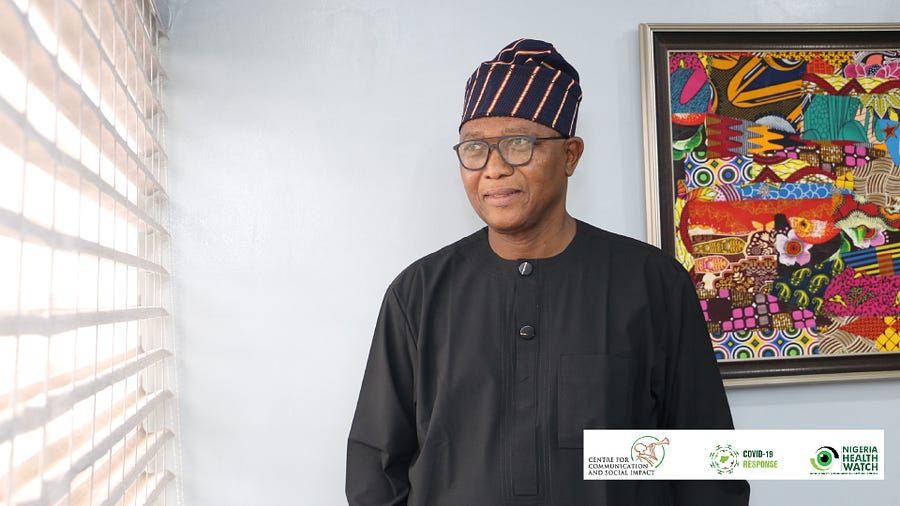
“We must decide who pays the bill” — COVID-19 exposes need for sustainable health system in Nigeria
The fact that COVID-19 has opened up support avenues for LUTH underscores the importance of building a robust, financially sustainable health system, Adeyemo pointed out. “Nigeria’s 95 or more percentage of health cases comes from out of pocket funding. We really need to change that, it is not sustainable. This pandemic is really stretching us to the limit but we are coping based on the support we have received,” he said, adding that the responsibility to make the health system work lies with every tier of government; Federal, state and local, because every level of healthcare, from primary to tertiary, needs to work. He said Nigeria has educated and well trained health practitioners, but needs adequate funding and critical facilities if the health system is to improve.
For LUTH’s CMD, Nigeria has a decision to make when it comes to financing its health sector. “We must decide who pays the bill,” he said, adding, “I don’t care whether it’s paid by the government, by NHIS, by employers, or by a combination of that, somebody must pay the bill.” He asserted that the National Health Insurance Scheme (NHIS) was one of the best ways to fund the health sector, and said the NHIS should be empowered to provide Universal Health Coverage. “They would be able to grow a pool of funds that would make it possible that no Nigerian will fall through the cracks. If their pool of money is there, and everybody pays, and everybody can access it, that would improve the health care of Nigerians,” he said.
For the LUTH team who have shown it is possible to provide care safely to pregnant mothers who are COVID-19 positive, their commitment doesn’t go unnoticed. “I know people who were part of the team, they didn’t tell their family that they were coming to operate on a COVID-19 patient because they didn’t want people to talk them out of doing it. That’s how committed they were. That special attention and passion is something I enjoy. This is just extraordinary, you know, that spirit of trying to give care even in situations where things are not ideal. I love that. And the joy seeing the mothers get better, we had people who were very sick and you see them recover and they can now give you a smile and clap when you come in,” Makwe reflected.
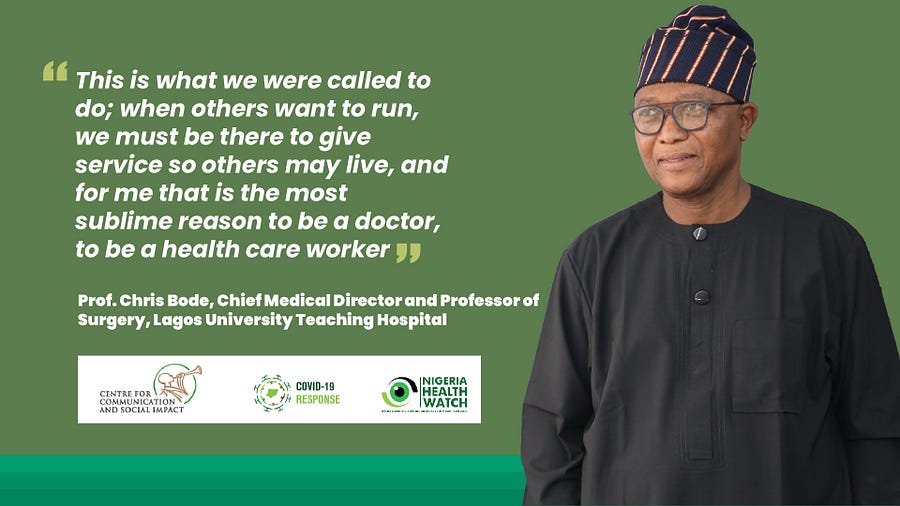
And LUTH’s CMD, Prof. Bode says he can’t help but be proud of what his team has achieved. “This is what we were called to do; when others want to run, we must be there to give service so others may live, and for me that is the most sublime reason to be a doctor, to be a health care worker,” he said, adding, “I’m very proud and the hospital is very proud, and I’m sure the nation too is very proud of any group of people that puts their lives on the line like that.”
He pointed out that living with COVID-19 is a new reality and Nigeria has to learn to live with it until the disease is overcome. For the team at LUTH, that means learning how to care for people in the hospital and community without endangering the staff. And finding that delicate balance is at the heart of Bode’s vision for LUTH as it evolves through the COVID-19 pandemic. “We want people to relate to us as health care workers who always deliver; we must find a purpose to make people believe in us in terms of what we do,” he said, adding, “We are a reference hospital not just another hospital; when they cannot solve those problems in other places, let them bring them here, and they must come with the hope that LUTH would do it.”
This documentation project is a collaboration between Nigeria Health Watch (NHW) and the Centre for Communication and Social Impact (CCSI). Follow the conversation online with the hashtag #COVID19NaijaResponse.


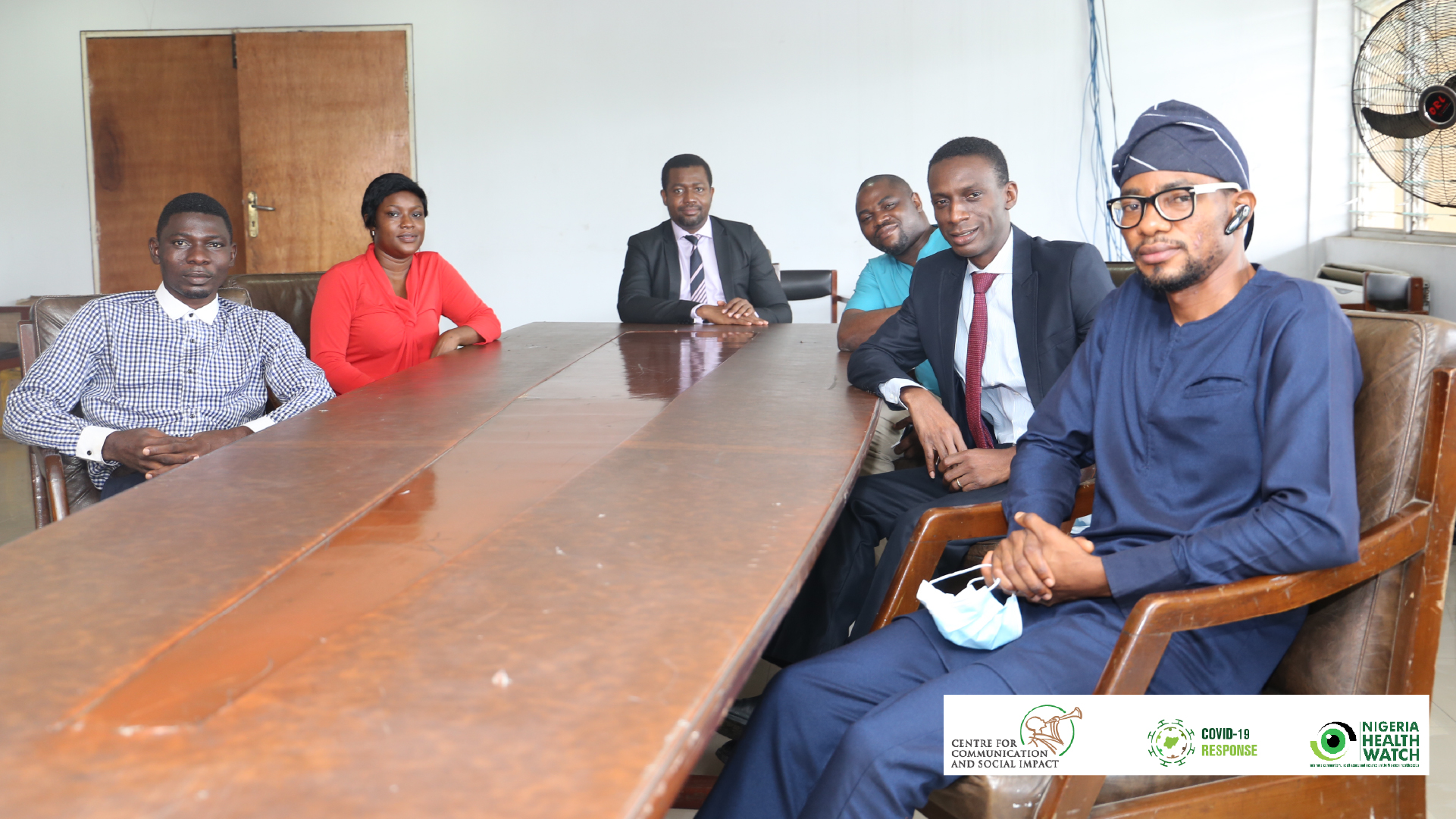
Thanks for this info
It’s really not easy been at the forefront of a pandemic.. what a tremendous work the doctors are doing.. they need more recognition and support in all areas.. really looking forward to been a part of this team someday